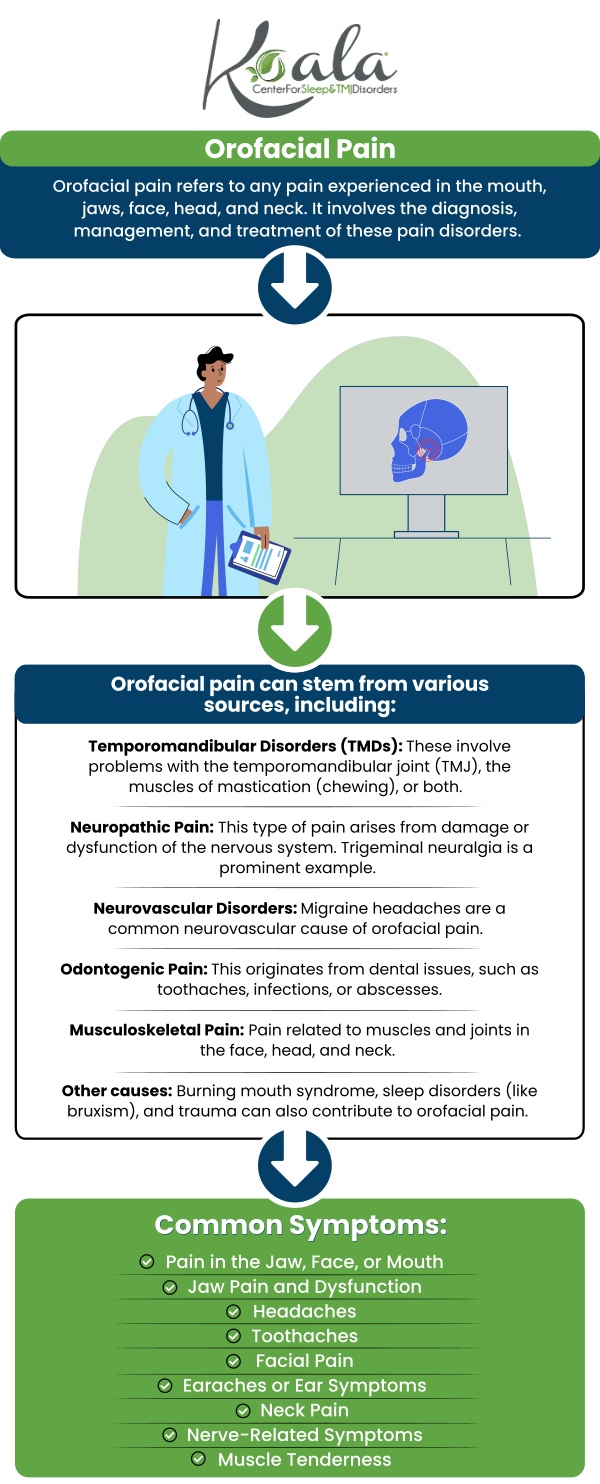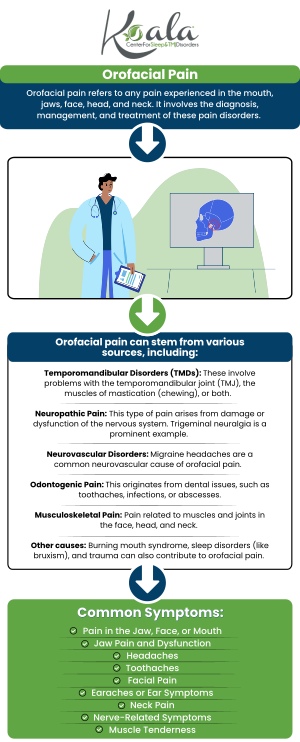Where Can I Find an Orofacial Pain Specialist in Wausau, WI
If you are consistently having pain in your mouth, jaw, or in your overall face, its time to see a specialist since it can be orofacial pain. Common symptoms include TMJ, sinus, and nerve disorders. Contact our team at Koala® Center For Sleep & TMJ Disorders for more information or visit us online to book an appointment. We serve patients from Wausau WI and surrounding areas.




Table of Contents:
What is orofacial pain?
What causes orofacial pain?
What are the common characteristics of orofacial pain?
How do you relieve orofacial pain?
Pain that affects the face, mouth, and jaw is known as orofacial pain. Dental issues, jaw issues, sinus infections, nerve disorders, and other medical conditions are just a few of the causes of this type of pain. The pain may be acute or chronic and range from mild to severe. There are several subtypes of orofacial pain, including:
– Temporomandibular joint disorder (TMJ) – This condition is characterized by ear pain and discomfort in the muscles that move the jaw joint.
– Sinus pain – Sinus pain is often caused by infection or inflammation.
– Headaches – This type of pain is brought on by tension, migraines, or sinus pressure, among other things.
– Neuropathic pain – This type of pain is often brought on by damage to the facial or oral nerves. A form of neuropathic pain known as trigeminal neuralgia is characterized by sudden, intense, and sharp facial pain.
– Musculoskeletal pain – Musculoskeletal pain can occur in the face muscles, neck muscles and surrounding joints.
– Dental pain – Dental discomfort is often brought on by problems with the teeth, such as injury, infection, or decay.
Orofacial pain has a multitude of potential causes. These include:
– Headaches – Orofacial pain can be brought on by a variety of headaches, such as tension headaches, migraines, and cluster headaches.
– Sinus infections – Pain in the face and jaw can result from an infection or inflammation of the sinuses.
– Nerve disorders – Orofacial pain, including trigeminal neuralgia, can be brought on by damage to or injury to the face or mouth’s nerves.
– Dental issues – Orofacial pain can be caused by dental problems such as cavities, gum disease, abscesses, and impacted teeth.
– Temporomandibular joint disorder (TMJ) – Orofacial pain can be a symptom of TMJ, which is characterized by discomfort in the muscles and joints of the jaw.
– Musculoskeletal issues – Problems with the muscles, bones, or joints in the face, jaw, or neck may result in orofacial pain.
– Psychological causes – Orofacial pain may be triggered by stress, anxiety, and depression.
Some of the common characteristics of orofacial pain include:
– Face, mouth, or jaw discomfort or pain.
– Limited jaw or neck range of motion.
– Face or jaw muscle tenseness or spasms.
– Sensitivity to cold or hot food or drink.
– Discomfort or difficulty chewing or biting.
– Migraines or headaches.
– Pain spreads from the face to other parts of the body, such as the neck or shoulders.
– Severe pain that disturbs sleep or concentration.
– Opening the mouth wide results in pain or worsens pain.
– Moving the jaw results in clicking, popping, or grinding noise.
It’s important to note that the characteristics of orofacial pain can vary depending on the underlying cause of the pain. It’s recommended to speak with a dedicated sleep team member if you are experiencing persistent or severe orofacial pain. They will determine the underlying cause of the discomfort and create an effective treatment plan.
The underlying cause of orofacial pain will determine the best course of treatment. Some potential treatments the team member may suggest include:
– Physical therapy – To relieve muscle tension and increase the range of motion in your jaw, an orofacial pain team member or physical therapist can teach you beneficial exercises and stretches.
– Medications – Ibuprofen or acetaminophen, which are over-the-counter painkillers, can help with mild to moderate orofacial pain. Prescription drugs such as muscle relaxants, antidepressants, or seizure medications may be used in more severe circumstances.
– Oral appliances – To relieve stress on the jaw joint and prevent teeth grinding and clenching, a specialist may advise wearing an oral appliance, such as a bite guard.
– Relaxation techniques – Exercises such as meditation and deep breathing can ease stress and tension in the face and jaw muscles.
– Lifestyle adjustments – Making lifestyle adjustments such as avoiding chewy or hard foods, sitting up straight, and staying away from jaw-straining activities can relieve orofacial pain.
– Surgery – In certain circumstances, surgery may be required to remove impacted teeth or to correct structural issues with the jaw.
If you have persistent or severe orofacial pain, you should consult a healthcare provider to identify the underlying cause and the most effective course of action.
If you’re seeking an orofacial pain specialist in Wausau, WI, our experienced doctors at Koala® Center For Sleep & TMJ Disorders can provide you with the expert care you need. Orofacial pain can stem from a variety of conditions, including temporomandibular joint (TMJ) disorders, teeth grinding, and other jaw-related issues. Our team specializes in diagnosing and treating the underlying causes of orofacial pain through personalized treatment plans.
Whether you’re dealing with chronic facial pain, headaches, or discomfort in your jaw and mouth, we offer a range of effective therapies to relieve your symptoms. At Koala® Center For Sleep & TMJ Disorders, we focus on providing targeted, non-invasive treatments tailored to your specific needs, helping you achieve long-lasting relief. If you’re in Wausau, WI, contact our office today to schedule a consultation and take the first step toward better health and comfort. Call or visit us online to book an appointment. We serve patients from Wausau WI, Schofield WI, Weston WI, Rothschild WI, Brokaw WI, and surrounding areas.

Additional Services You May Need
▸ KoalaKIDZzz®
▸ Sleep Apnea
▸ Snoring
▸ TMJ Disorder
▸ Fatigue
▸ Sleep Disorders
▸ Weight Loss
▸ CPAP Alternative
▸ Oral Appliances




